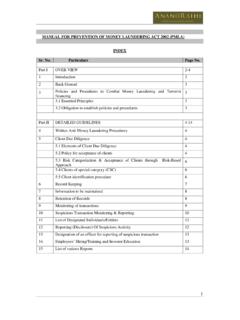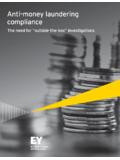Transcription of Money Laundering Risks and E-Gaming: an Overview
1 Money Laundering Risks AND E- gaming : A EUROPEAN Overview AND ASSESSMENT. Final Report Michael Levi, , (Econ.). Professor of Criminology Cardiff School of Social Sciences Cardiff University Wales, UK. September 2009. 2. CONTENTS. Acknowledgements .. 3. Executive Summary .. 4. Areas of Risk .. 4. Efforts to combat Money - Laundering .. 5. Conclusions .. 6. 1. Introduction .. 7. What is Money - Laundering ? .. 7. 2. Risks and Threats in Money - Laundering and e- gaming .. 8. E- gaming in Europe: the Economic Context .. 10. Money - Laundering Techniques .. 11. Literature review of Money Laundering in e- gaming .. 12. Areas of Money - Laundering Risk .. 14. 3. Counter-measures against Fraud and Money - Laundering in the Regulated e- gaming Sector .. 19. Money Laundering controls in the online gaming industry .. 19. Know Your Customer (KYC).. 21. Comparison with other sectors .. 22. 4. Assessing Compliance of the e- gaming Sector with AML Efforts .. 24. Reporting of Suspicious Transactions.
2 24. Conclusions .. 25. References .. 27. Annex 1 The FATF Report on Casinos (2008) .. 28. 3. ACKNOWLEDGEMENTS. I am grateful to the European gaming and Betting Association, especially Florian Cartoux, for their support for this project; to the compliance officers, payment card experts, police, professional gamblers, regulators and UK. Payments staff who gave of their expertise and time, and commented on earlier drafts; and to Michael Gold for his research assistance. Michael Levi is currently funded by a UK Economic and Social Research Council Professorial Fellowship (RES- 051-27 0208). 4. EXECUTIVE SUMMARY. This report reviews the threat that Money Laundering through the e- gaming industry presents and could plausibly present to society, and the ways in which the regulated e- gaming industry discharges its duty to reduce Money Laundering in the EU. Industry representatives interviewed agree that there can be leakage'. through which launderers may move some proceeds of some crimes, though the Risks associated with the sector are comparatively modest, due to the high traceability of e- gaming transactions and the customer identification controls in the regulated sector.
3 However this report suggests that it is not a realistic policy goal for governments in a free society to eliminate Money Laundering Risks altogether: the aim should be to reduce to a tolerable level the risk that e- gaming may assist other crimes. This is done in two ways: controls over ownership; and controls over the operation of e- gaming itself. One reason to prefer regulation over prohibition is to ensure that operators have to undergo a fit and proper person' test before receiving a licence, preventing people with links to organised crime and terrorist groups from owning what could be vehicles for Laundering if there were no controls or if controls were over-ridden by powerful managers or 1. beneficial owners. The second reason is to encourage e- gaming companies to develop a set of procedures approved by regulators to reduce integrity Risks . One question raised in this review is how plausible it is that a significant amount of this total Laundering in the billions of Euros - would occur via e- gaming .
4 E- gaming (as contrasted with land-based forms of gambling). does not directly feature significantly, or indeed at all, in the recent published threat assessments of Europol and other European policing organisations, or in their policing priorities. To date, generalised and understandable expressions of concerns by Europol and by the Financial Action Task Force about Money Laundering Risks posed by the Internet have not been accompanied by evidence of significant Laundering via e- gaming . AREAS OF RISK. 1. Online gaming firms can credit winnings or unused funds back to an account other than the one on which the original bet was made: an issue which gaming firms share with other business areas. 2. The use of front people' through whom to run gaming transactions. 3. Peer to peer games, where value transfers can occur between both electronic and human players as a result of deliberate losses, at a relatively low cost to the players. 4.
5 Payment in (and out) via other financial intermediaries which are regulated for AML purposes but where Know Your Customer is of modest or variable quality. The corrupt fixing' of sports results or individual events on which betting takes place, generating fraud and proceeds of crime, is sometimes considered to be Money Laundering . However this is the making of a dishonest profit rather than hiding and transforming the proceeds of crimes that have been committed in the community. Likewise, identity fraudsters can use financial instruments they have acquired to gamble for pleasure and to transfer modest sums to other media: but this is more fraud than it is Money Laundering . 1. A beneficial owner' is someone on whose behalf a company is run, whether or not they are listed on documents as the nominal owner. 5. EFFORTS TO combat Money - Laundering . Online gaming companies licensed and regulated in the EU have chosen to comply with the Third EU Directive for the prevention of Money - Laundering which strictly speaking applies only to casinos within the gaming sector.
6 In addition, the regulated sector also subscribes to codes of conduct such as that of the European 2 3. gaming and Betting Association and the Remote Gambling Association. On-line gaming companies collect a significant amount of data on the IP addresses, gaming and gaming finance patterns of their customers, which are used to build up profiles against which to assess the Risks posed by particular customers. E- gaming firms vary in the extent to which they impose spending limits, and in general business sectors and financial services, this would be regarded as a purely business decision, unless their solvency was threatened, which in this case would be very unlikely. Greater diligence is (and should be). exercised where gaming limits are higher, since this generates greater Laundering opportunities. All the businesses interviewed have different business models, and consequently implement risk based solutions to mitigate the potential for anti- Money Laundering and crime Risks .
7 The operators interviewed acknowledge that there is no single magic bullet to combat crime, but that a cocktail of tools which may vary over time - is required to combat any Risks in a proportionate manner. Consequently they employ a hybrid anti-fraud model using a combination of techniques including but not limited to manual, external data checks, internal business rules, statistical profiling. In addition, some businesses are utilising are or intend to utilise advanced machine learning techniques. Analytically, these may be split up into categories as follows: Manual o Agents flag cases they consider to be suspicious based on risk alerts, customer tip-offs and unusual betting and or wagering play by customers Third Party Data o Age Verification lists sourced from firms in the market o Hotlists, including the sorts of data sources used by banks to identify terrorists and public officials (entitled Politically Exposed Persons') who require Enhanced Due Diligence'.
8 O Telematching o The European Sports Security Association watch list Rules Based o Pre-defined rules based on business knowledge and past experiences. For example limitation on the number of credit cards that can be used; device reputation models Statistical Profiling o Outliers of transactional behaviour determined through regression analysis o Risk scoring models Advanced Analytics Artificial Intelligence o Creating predictive modelling techniques o Implementation of neural networks to assist the human thought process in detecting fraudulent trends 2. 3. 6. Compared to methods of customer identification and monitoring in the off-line gaming and financial services sector, the scope for substantial abuse of e- gaming for Laundering purposes is modest, both for those crimes that generate cash and for those that do not. This is partly a result of the greater recording of transactions in this industry than in most others, and partly the consequence of legitimate firms being subject to regulation.
9 The industry does make efforts to identify and report suspicious activities by customers, though as in every area of commerce firms have different approaches to this. In itself, the number of Suspicious Activity Reports is neither a success nor a failure indicator of AML effectiveness. The more effective that front-line Know Your Customer (KYC) controls are and the less inherently exploitable an industry is to large post account-opening expansion of trading (enabling more funds to be laundered), the smaller the overall Laundering problem that it poses: subject to their skills and contacts, offenders typically will search for easier ways to launder. Thus if Money Laundering controls are tight and are perceived by offenders to be tight - or if e- gaming is not contemplated at all by them as a Laundering route - one might expect few Suspicious Activity Reports (SARs) to be made. In the UK in 2007-2008, out of a total of 210,052 SARs, the gaming sector made 403 SARs (up from 299 in 2006-07), of which 24 involved requests for consent to permit dealing with a person whose transactions they suspected of being proceeds of crime: however there is no breakdown for e- gaming compared with land- 4.
10 Based gaming . By way of comparison, there were 33 reports direct from credit card companies, and 280. reports from spread betting firms; 7,299 reports from Money transmission firms, and 3,553 from bureaux de 5. change. One SAR from the gaming sector was considered sufficiently indicative to be transmitted to the National Terrorist Finance Unit for further investigation. Analogous data are not available EU-wide. CONCLUSIONS. Risk levels are a combination of criminal motivations, existing/developing criminal capacities, and situational opportunities for crimes offered by the ways control is organised. There is scope for improvement in controls over fraud and Laundering , and regulators need to be vigilant about the levels of resourcing of anti-fraud/AML. efforts in the private sector and internationally consistent in their requirements, following deliberation between different regulators and consultation with the industry. There is much mythology about e- gaming Laundering Risks , fed by inadequate information and a tendency to project a dislike of gaming and/or private sector involvement in it into alarm about e-crime in general and the role of gaming in this.



